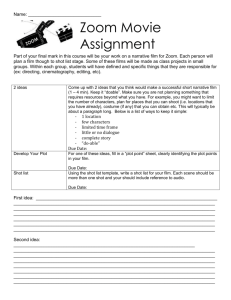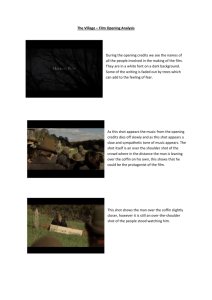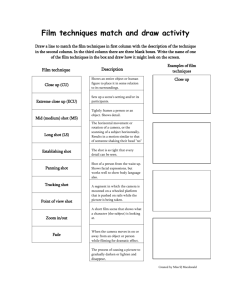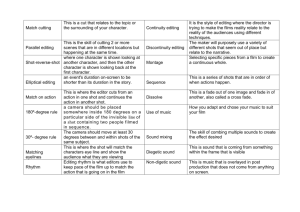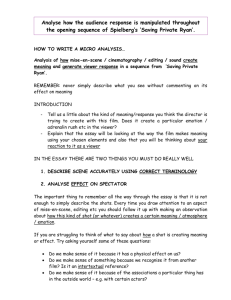Film Study Introduction
advertisement
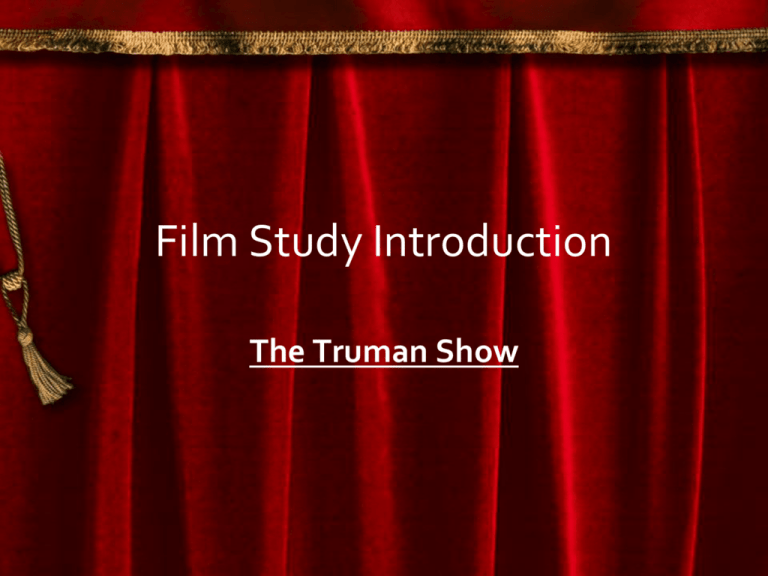
Film Study Introduction The Truman Show Studying a Film • Film is an important medium which provide us with understanding of the world around us and human behaviour. • When studying a film we need to consider; – Aspects of the film such as character, setting, theme, narrative, structure, conflict etc. – The techniques used and their effects – The choices made by the director in order to impart meaning. Assessment • AS 2.2 (External)- an essay on a studied film in your end of year exam. • AS 2.10 (Internal)- A close viewing of a selected scene from the film- you will write a report analysing the techniques used. Film Techniques • In order to effectively analyse a film you need to have a sound understanding of film techniques and their effects. • You need to understand: – Visual techniques – Verbal techniques – Editing techniques Some General Film Terms • Director • Cinematography • Shot • Costume • Scene • Props • Sequence • Colour Palette • Frame Mise en Scene • This refers to all the things that are 'put in the scene', as well as the way that we are shown them. • Set design, costume, props, composition, lighting, the general visual environment, camera placement and movement, the placement of actors, the actions of actors and the dialogue. • It refers to everything that takes place on set BEFORE the editing process. Camera Work • • • • • • • • • Extreme Close Up Close Up Mid/Medium Shot Long Shot Extreme Long Shot High Angle Low Angle Bird’s Eye View Eye Level • Two Shot • Over the Shoulder Shot • Point of View Shot • Track • Pan • Tilt • Zoom • Establishing Shot Editing Techniques • • • • • • • Cut Cross Cut Fade Dissolve Montage Flashback/ Flashforward Editing Pace Lighting • High Key Lighting • Low Key Lighting • Back Lighting • Colour Filters Verbal/Aural Techniques • • • • • • • • Dialogue Sound Effects Voice Over Soundtrack Ambient Sound Diegetic Sound Non-diegetic Sound Aural Bridge The Truman Show Directed by Peter Weir The Truman Show • Directed by Peter Weir • Screenplay by Andrew Niccol • Truman Burbank- Jim Carrey What is it about? Truman Burbank is the unsuspecting star of The Truman Show, a reality television program in which his entire life, since before birth, is filmed by thousands of hidden cameras, 24 hours a day, 7 days a week, and broadcast live around the world. The show's creator and executive producer Christof is able to capture Truman's real emotion and human behavior when put in certain situations. Truman becomes suspicious of his perceived reality and embarks on a quest to discover the truth about his life. Satire • Satire is a genre of literature, in which vices, follies, abuses, and shortcomings are held up to ridicule, ideally with the intent of shaming individuals, corporations, government or society itself, into improvement. • Although satire is usually meant to be humorous, its greater purpose is often constructive social criticism, using wit as a weapon and as a tool to draw attention to both particular and wider issues in society. Social Science Fiction • Social science fiction is a subgenre of science fiction, concerned less with technology and more with sociological speculation about human society. • In other words, it speculates about human behaviour and interactions. • Exploration of fictional societies is a significant aspect of science fiction, allowing it to be predictive and precautionary, to criticize the contemporary world and to present solutions, to portray alternative societies and to examine the implications of ethical principles. Themes/Key Ideas • Loss of Innocence • Reality vs. Unreality • The Nature of the Media • Consumerism
